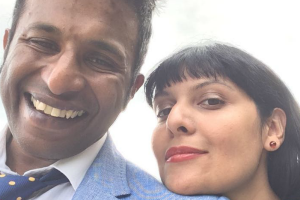Dr Anita Bannerjee: Love and red heels

On our first date, we went to a bar in Charlotte Street. He made me laugh and I liked his energy. By the end of the evening, I already loved him.
It was a few weeks later that he told me. I was standing in the kitchen of the hospital, my pager strapped to my belt as the kettle hissed. He had Addison’s disease. That MCQ condition that belonged to the medical school textbooks, not my boyfriend.
I went with him to his outpatient clinic. The waiting room felt subhuman, overcrowded, suffocating. His endocrinologist was wearing fishnet stockings and high stilettos. I love my scarlet work shoes, I thought, as she spoke. Did my patients feel my red heels trivialised the gravitas of their plight, in the same way her attire made me feel now?
I don’t remember much of what she said; I had no better understanding when I left, of what living with Addison’s disease meant, or the implications on our future. I had felt too stupid to ask.
I wanted to shield him as he lay there on the steel slab, half-naked
The first time I witnessed him having an Addisonian crisis we had only been married for two months. ‘I don’t want to die,’ he pleaded as the ambulance took him away. And as I tried to comfort him, I think he knew what I saw, that he was the colour of death. A colour we both recognised, being doctors.
That was the first time I had attended a hospital as a patient. I cried. And although doctors, nurses, porters came and went, I felt the most gratitude to the kind healthcare assistant who brought him a blanket. It was so cold.
Three years later, we welcomed our first baby. As he held her close to me he said: ‘Look Anita, look how beautiful she is.’ And two years after that, our second daughter arrived. The theatre staff laughed as he danced around the operating theatre with her.
Over Christmas 2017, he had another crisis. When the paramedics arrived, he lay there ashen with a blood pressure of 60/30. From inside the ambulance, I watched the blue light flash violently across our home in the death of night. ‘Eight minutes to resus, 40 year-old male, Addisonian crisis,’ somebody said.
When we arrived, I stood anonymously in the corner of the resuscitation cubicle, clutching a plastic bag containing his belongings. I wanted to shield him as he lay there on the steel slab, half-naked. Multiple cannula attempts had left a pool of his blood seeping through the sheets.
After his steroid bolus, he started inappropriately laughing like an undignified hyena. He looked so vulnerable lying there in his hospital gown, singing gibberish to the Consultant.
Seventy two hours later he had made a full recovery. And I thanked God with every fibre of my being. After this, I learnt that very little really matters in life. I no longer feared litigation which liberated me to be more human and less doctor with my patients.
And I don’t wear red heels to work anymore.
Dr Anita Bannerjee is a GP in south London
Click here to read all the entries to Pulse’s annual writing competition
Visit Pulse Reference for details on 140 symptoms, including easily searchable symptoms and categories, offering you a free platform to check symptoms and receive potential diagnoses during consultations.









